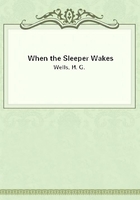
第43章
The Council never hesitated, never faltered. Means of communication, land, buildings, governments, municipalities, the territorial companies of the tropics, every human enterprise, it gathered greedily. And it drilled and marshalled its men, its railway police, its roadway police, its house guards, and drain and cable guards, its hosts of land-workers. Their unions it did not fight, but it undermined and betrayed and bought them. It bought the world at last. And, finally, its culminating stroke was the introduction of flying.
When the Council, in conflict with the workers in some of its huge monopolies, did something flagrantly illegal and that without even the ordinary civility of bribery, the old Law, alarmed for the profits of its complaisance, looked about it for weapons. But there were no more armies, no fighting navies; the age of Peace had' come. The only possible war ships were the great steam vessels of the Council's Navigation Trust. The police forces they controlled; the police of the railways, of the ships, of their agricultural estates, their time-keepers and order-keepers, outnumbered the neglected little forces of the old country and municipal organisations ten to one. And they produced flying machines. There were men alive still who could remember the last great debate in the London House of Commons--the legal party, the party against the Council was in a minority, but it made a desperate fight--and how the members came crowding out upon the terrace to see these great unfamiliar winged shapes circling quietly overhead. The Council had soared to its power. The last sham of a democracy that had permitted unlimited irresponsible property was at an end.
Within one hundred and fifty years of Graham's falling asleep, his Council had thrown off its disguises and ruled openly, supreme in his name. Elections had become a cheerful formality, a septennial folly, an ancient unmeaning custom; a social Parliament as inefectual as the convocation of the Established Church in Victorian times assembled now and then;and a legitimate King of England, disinherited, drunken and witless, played foolishly in a second-rate music-hall. So the magnificent dream of the nineteenth century, the noble project of universal individual liberty and universal happiness, touched by a disease of honour, crippled by a superstition of absolute property, crippled by the religious feuds that had robbed the common citizens of education, robbed men of standards of conduct, and brought the sanctions of morality to utter contempt, had worked itself out in the face of invention and ignoble enterprise, first to a warring plutocracy, and finally to the rule of a supreme plutocrat. His Council at last had ceased even to trouble to have its decrees endorsed by the constitutional authorities, and he a motionless, sunken, yellow-skinned figure had lain, neither dead nor living, recognisably and immediately Master of the Earth. And awoke at last to find himself--Master of that inheritance! Awoke to stand under the cloudless empty sky and gaze down upon the greatness of his dominion.
To what end had he awakened? Was this city, this hive of hopeless toilers, the final refutation of his ancient hopes? Or was the fire of liberty, the fire that had blazed and waned in the years of his past life, still smouldering below there? He thought of the stir and impulse of the song of the revolution. Was that song merely the trick of a demagogue, to be forgotten when its purpose was served? Was the hope that still stirred within him only the memory of abandoned things, the vestige of a creed outworn? Or had it a wider meaning, an import interwoven with the destiny of man?
To what end had he awakened, what was there for him to do? Humanity was spread below him like a map.
He thought of the millions and millions of humanity following each other unceasingly for ever out of the darkness of non-existence into the darkness of death.
To what end? Aim there must be, but it transcended his power of thought. He saw for the first time clearly his own infinite littleness, saw stark and terrible the tragic contrast of human strength and the craving of the human heart. For that little while he knew himself for the petty accident he was, and knew therewith the greatness of his desire. And suddenly his littleness was intolerable, his aspiration was intolerable, and there came to him an irresistible impulse to pray. And he prayed. He prayed vague, incoherent, contradictory things, his soul strained up through time and space and all the fleeting multitudinous confusion of being, towards something--he scarcely knew what--towards something that could comprehend his striving and endure.
A man and a woman were far below on a roof space to the southward enjoying the freshness of the morning air. The man had brought out a perspective glass to spy upon the Council House and he was showing her how to use it. Presently their curiosity was satisfied, they could see no traces of bloodshed from their position, and after a survey of the empty sky she came round to the crow's nest. And there she saw two little black figures, so small it was hard to believe they were men, one who watched and one who gesticulated with hands outstretched to the silent emptiness of Heaven.
She handed the glass to the man. He looked and exclaimed: